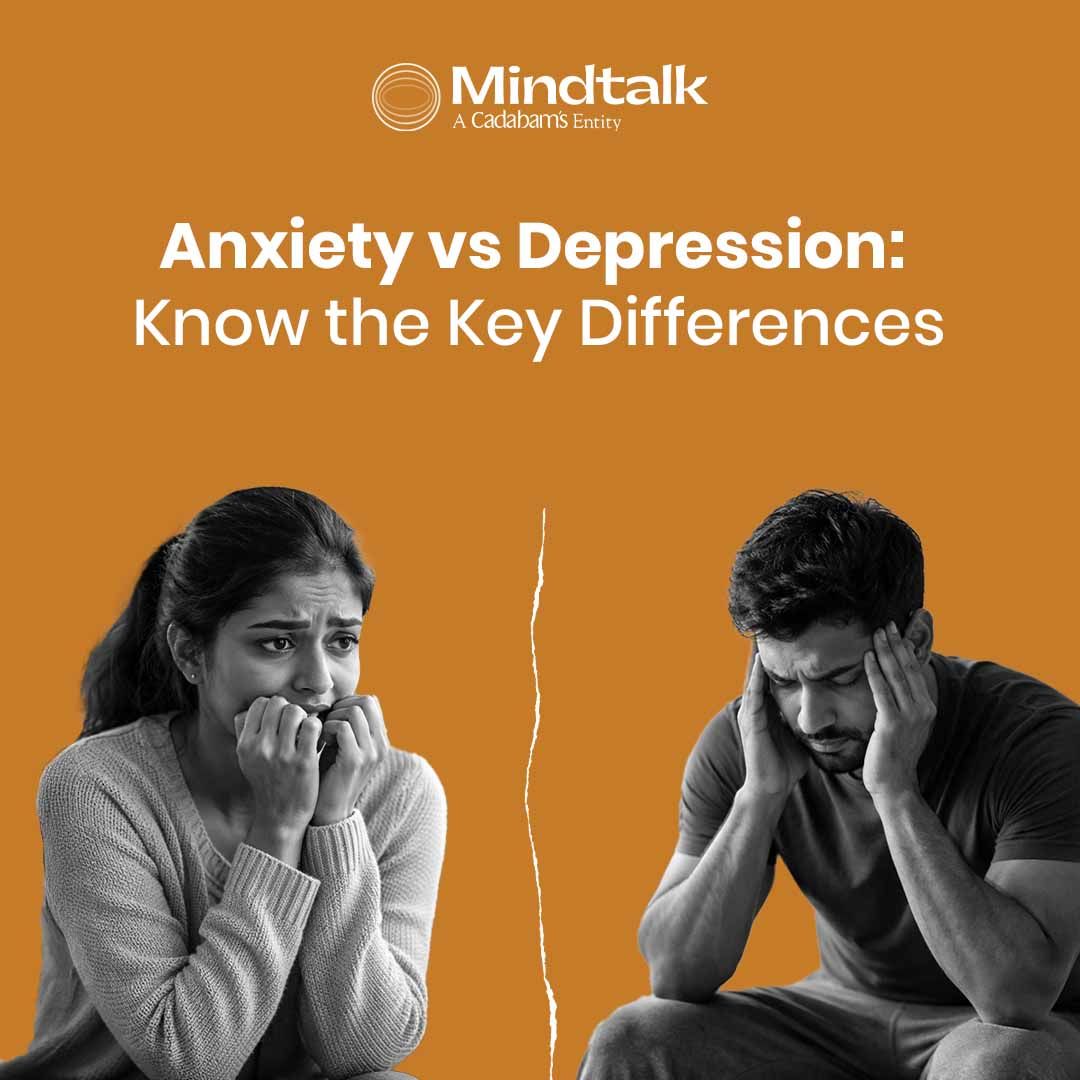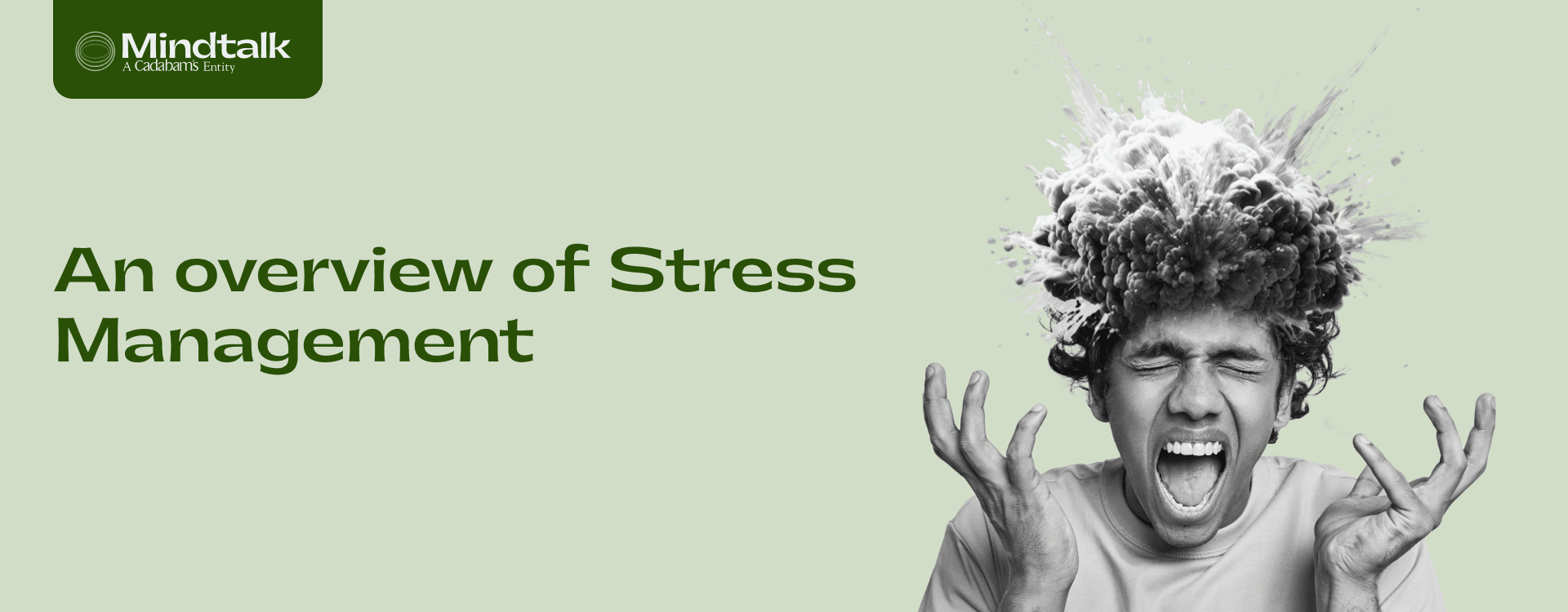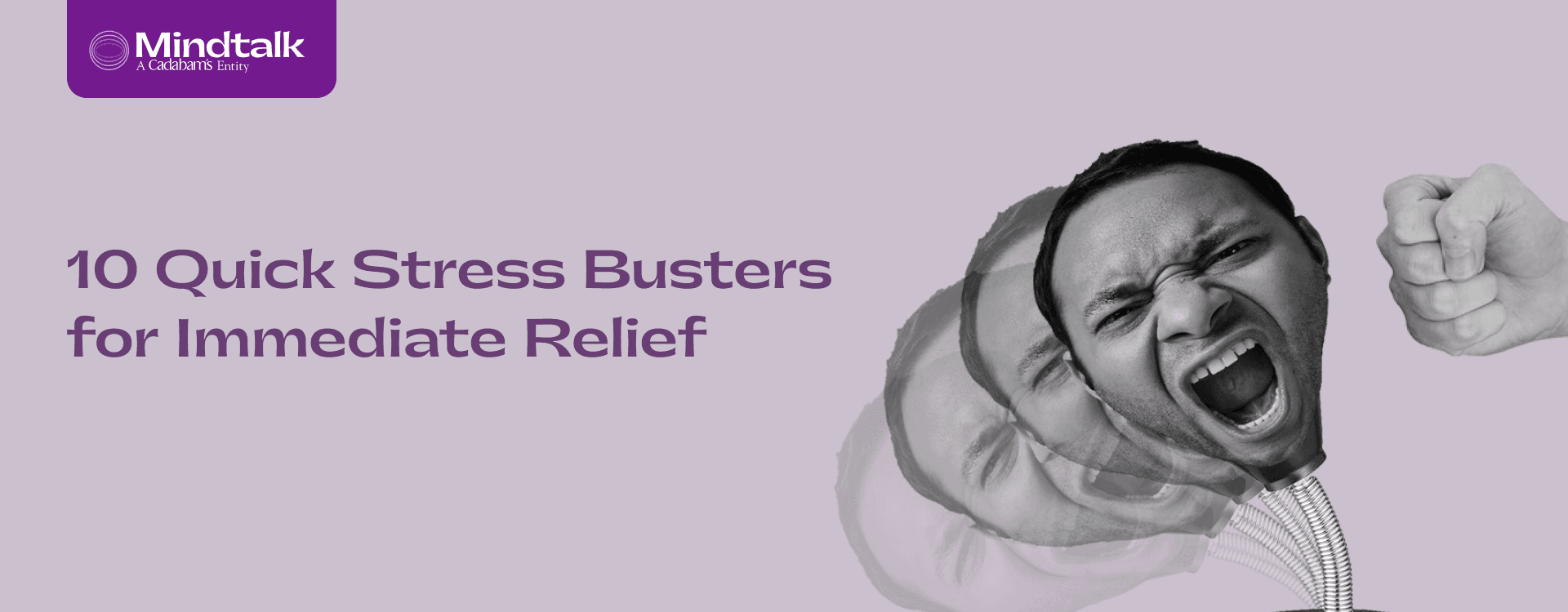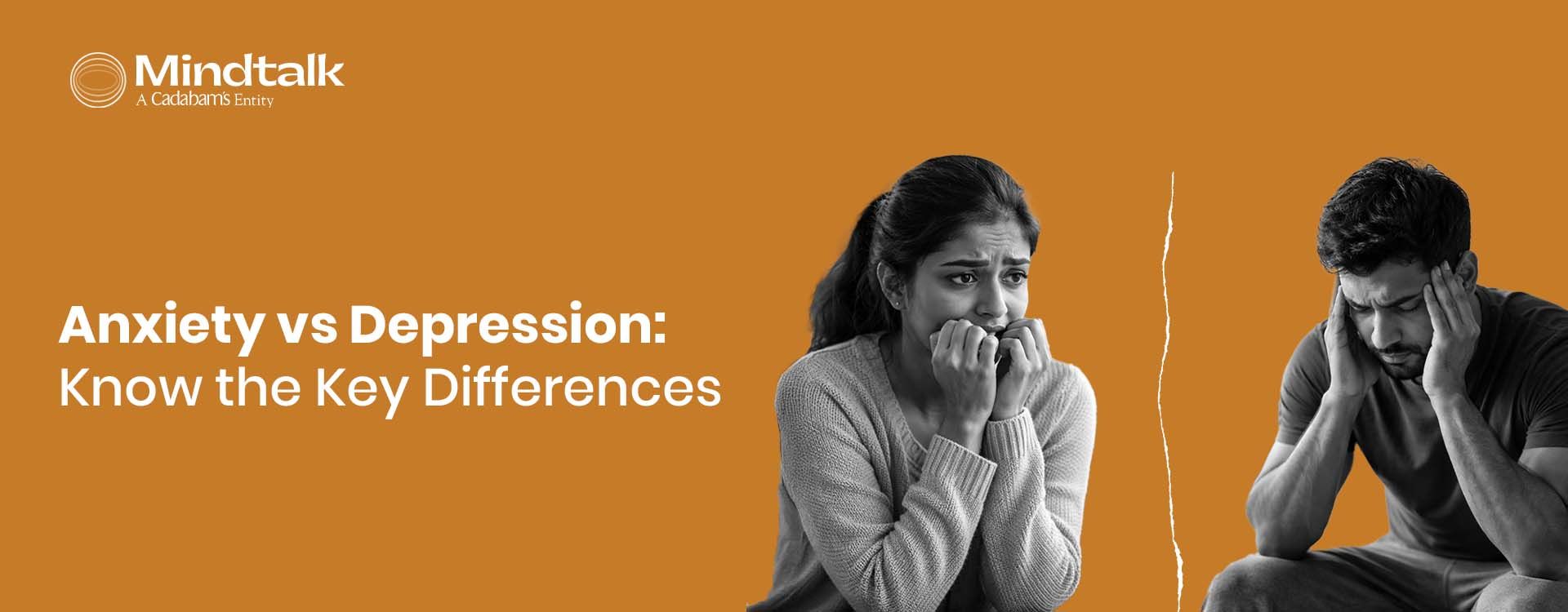Anxiety vs. Depression: How to Recognize and Manage Symptoms
At first glance, depression and anxiety appear to be very different illnesses: Depression is usually associated with low energy and sadness, while anxiety is often associated with restlessness and fear. However, the two disorders often overlap, making their diagnosis complicated and making it hard to tell the difference between anxiety and depression. Knowing whether these two disorders trouble someone together or differently is crucial to providing the best treatment and diagnosing red flags early. Understanding the signs of depression and anxiety helps tailor the most effective care.

Why It’s Important to Differentiate Anxiety and Depression
Misinterpreting symptoms of anxiety and depression can delay proper treatment and worsen mental health.
Many might ask, “what is depression and anxiety?”While both conditions share emotional and physical signs, their core causes and impact on daily life differ.
Identifying whether one is dealing with anxiety or depression ensures targeted therapy and lifestyle changes for long-term recovery. Understanding the difference between anxiety and depression ensures appropriate treatment.
The Impact of Misunderstanding Symptoms
When the symptoms of anxiety and depression are misdiagnosed, individuals may receive the wrong treatment, exacerbating their condition.
A person struggling with how to overcome depression and anxiety may not realise that their symptoms require different therapeutic approaches, leading to prolonged distress and ineffective coping strategies.
How Early Identification Helps Recovery
Recognising signs of depression and anxiety early allows for prompt intervention, reducing long-term mental strain.
Whether through therapy, lifestyle changes, or medication, treatment for anxiety and depression becomes significantly more effective when started early.
Breaking Down Anxiety and Depression
To understand “what is the difference between anxiety and depression?” are, it is crucial to examine each condition individually.
Although they often co-occur, their underlying mechanisms, triggers and effects on emotions and behaviour differ significantly.
What is Anxiety?
Anxiety is the body’s natural response to stress, which often manifests as excessive worry, fear or nervousness.
It can interfere with daily life and make you feel constantly restless. If left untreated, it can contribute to a complex cycle of anxiety and depression.
What is Depression?
Depression is a persistent mental illness characterised by profound sadness, hopelessness and disinterest in daily activities.
Unlike temporary mood swings, it can affect motivation, sleep and self-esteem, causing the individual to seek advice on “how to come out of depression and anxiety?”.
Recognising Symptoms Unique to Anxiety
While depression and anxiety can cause similar emotional and physical changes, anxiety is often associated with hyperactivity and fear rather than withdrawal.
Noticing unique symptoms of anxiety and depression can help determine how to treat depression and anxiety more accurately.
Emotional Characteristics
Understanding the emotional characteristics associated with anxiety and depression is key to recognising how these feelings manifest and affect your daily life. The following are given below:-
- Excessive worry: They are obsessed with worst-case scenarios, ignoring all of the most important clear threats. In its most anxiety-inducing form, you make the most mundane actions you can resist seem like an impossible Herculean task.
- Irritability: You only need a short burst of frustration to become angry and lose your temper. Frustrating minor events can escalate your lack of control and destroy your relationships with other people.
- Restlessness: A restless person finds it difficult to relax and often makes movements that they are not aware of because they can no longer think. These incessant physical and mental movements have a single goal: to escape from deep-seated boredom and procrastination.
- The feeling of impending doom: the abnormal anxiety that occurs in anticipation of an undesirable outcome. Even in safe places or conditions, individuals may feel overly vigilant.
- Difficulty concentrating: The amount of anxious thoughts increases to such an extent that it is impossible to achieve any form of balance. People who are unable to somehow block out problems they are worried about usually fail at work, in conversations and in fulfilling their duties.
Fear, irritability, racing thoughts, and restlessness can guide people toward specific therapy for depression and anxiety.
These emotional patterns often raise questions about how to deal with anxiety and depression effectively.
Physical Characteristics
Understanding the causes of depression and anxiety is essential for recognising how these conditions manifest physically and emotionally.
- Rapid heartbeat: Increased heart rate, often mistaken for heart problems. This symptom can feel like a panic attack and cause further stress.
- Shortness of breath: The feeling of breathlessness, especially in stressful situations. Many describe it as a suffocating feeling that worsens during a panic attack.
- Muscle tension: Chronic stiffness, especially in the neck and shoulders. The body is in a constant state of alertness, which leads to persistent pain.
- Sweating or trembling: Physical reaction to increased activity of the nervous system. This can also be triggered in situations where there is no actual danger.
- Sleep disorders: Difficulty falling asleep or staying asleep due to racing thoughts. Worries about the past or the future can make restful sleep seem unattainable.
Recognising Symptoms Unique to Depression
Unlike anxiety, depression often leads to emotional numbness and lack of energy rather than increased alertness. Understanding these signs can help you recognise how to treat depression and anxiety with appropriate interventions.
Emotional Characteristics
Understanding how to overcome depression and anxiety is key to addressing emotional challenges and improving your mental well-being.
- Persistent sadness: You feel a sense of dread or emptiness most days, which makes you feel emotionally ‘numb' and unable to find joy in life.
- Loss of interest: You have lost interest in activities that you used to enjoy, such as self-care, socialising or hobbies. Everything seems pointless.
- Feelings of guilt or worthlessness: You are overly critical of yourself and focus on your mistakes, even if they are insignificant. You tend to view life through a lens of personal failure.
- Social withdrawal: You avoid talking to family, friends and the public. Because of past interactions, conversations may seem mentally exhausting or unbearably overwhelming.
- Difficulty making decisions: You may feel mentally foggy, making it difficult to make simple decisions, such as what to eat. These tasks become tiring and discouraging.
Physical Characteristics
Understanding the causes of depression and anxiety helps explain why these physical characteristics arise and how they impact daily life.
- Chronic fatigue: you feel drained, even after complete rest. Tasks that used to be easy now require immense effort.
- Changes in appetite: You eat too much or too little, leading to weight fluctuations. Food can either be a source of comfort or completely unappealing.
- Slow movement or speech: Decreased physical energy, making everyday tasks seem exhausting. Even simple conversations can seem like a chore.
- Pain and discomfort: Unexplained body pain or headaches. Depression often manifests itself physically and leads to persistent discomfort.
- Restless sleep: Insomnia or excessive sleeping habits. Those affected may have difficulty getting out of bed or sleep only fragmentarily.
Depression symptoms often include persistent sadness, fatigue, and social withdrawal. Understanding these can help in identifying the right treatment for anxiety and depression.
How to Tell Anxiety and Depression Apart
Although anxiety and depression share similarities, their effects on feelings, thoughts and behaviours differ significantly. People often search for how to come out of depression and anxiety when the line between both becomes unclear. Recognising these differences is the key to effective management.
Common Overlapping Symptoms
Understanding how to deal with anxiety and depression can help you manage the common symptoms that often overlap, leading to a more balanced life. The following are given below:-
- Relentless anxiety: Both conditions cause one to worry about daily activities, but anxiety focuses on future threats, while depression causes the individual to feel helpless.
- Exhaustion and lack of energy: This feeling of exhaustion manifests itself through the anxious cycle of overthinking or lethargy caused by depression.
- Inability to concentrate: The individual’s ability to concentrate is affected by both disorders, making it very difficult to make decisions and fulfil commitments.
- Sleep problems: Both insomnia and hypersomnia can occur with both disorders, with anxiety causing difficulty falling asleep and depression leading to fragmentation of sleep during the night.
- Anger: Anxiety and depression can occur simultaneously. As a result, one is likely to struggle from uncontrollable mood swings, anger and sensitivity to stress.
How to Recognise Shared Symptoms
Understanding the difference between anxiety vs depression can help identify the shared symptoms and how they impact your emotional and physical well-being. The following are given below:-
- Think about inner actions: Anxiety consumes us with excessive rumination, while depression leads to hopeless and empty thoughts.
- Assess the associated symptoms: Anxiety shows palpitations and hyperactivity, while depression is characterised by low energy and fatigue.
- Emotional response: The emotional response of anxiety is fear, and that of depression is numbness and sadness.
Emotional Differences
Recognising the emotional differences between anxiety vs depression is crucial for understanding how each affects your feelings and reactions.
- Anxiety: Causes persistent fear, excessive worry and restlessness, often associated with uncertainty about the future.
- Depression: Leads to deep sadness, emptiness and disinterest in life, making daily activities feel overwhelming.
- Emotional triggers: Anxiety is caused by anticipatory stress, while depression is triggered by feelings of worthlessness or despair.
Physical Differences
Exploring the causes of depression and anxiety can help us understand how these physical differences affect your body and behaviour in unique ways.
- Anxiety: Causes heart palpitations, tense muscles, dizziness and shortness of breath due to the body’s fight-or-flight response.
- Depression: manifests as low energy, loss of appetite and, persistent fatigue and slows down movement and thought processing.
- Behavioural symptoms: Anxiety leads to avoidance behaviour and excessive preparation, while depression leads to withdrawal and lack of motivation.
It’s not uncommon to experience anxiety vs depression symptoms simultaneously.
These overlapping conditions require specialised therapy for depression and anxiety to avoid prolonged suffering.
Co-Occurring Anxiety and Depression
Depression and anxiety often occur together, making diagnosis and treatment difficult. Understanding how to come out of depression and anxiety as a combined challenge helps in the search for effective treatment for anxiety and depression.
Why These Conditions Often Appear Together
Anxiety and depression often occur together because of overlapping brain chemistry, emotional triggers and life stressors.
People with chronic anxiety often develop depression when the constant worry leads to exhaustion.
- Common neurotransmitters: In both disorders, there is an imbalance of serotonin, dopamine and noradrenaline.
- Emotional exhaustion: Persistent anxiety may lead to hopelessness and depressive symptoms.
- Avoidance behaviour: Avoiding stressors due to anxiety can lead to social withdrawal and depressive thoughts.
Challenges in Diagnosing Co-Occurring Conditions
Distinguishing between anxiety and depression is difficult when symptoms overlap, which delays proper diagnosis and treatment.
- Symptoms overlap: Fatigue, irritability, and difficulty concentrating happen with both disorders.
- Misinterpretation of symptoms: Anxiety and restlessness can hide depressive episodes.
- Delayed treatment: People without a precise diagnosis may receive inadequate care.
Treatment Strategies for Dual Diagnosis
Managing anxiety and depression simultaneously needs a multidisciplinary approach that looks for the origins of the problem.
- Cognitive behavioural therapy (CBT): Overcoming negative self-talk patterns.
- Medication: Both anxiety and depression respond to treatment with antidepressants,: SSRIs, in particular.
- Lifestyle changes: Spending more time in outdoor physical activities and optimising dietary habits and sleeping routines are key to getting rid of depression and anxiety.
Effective treatment for anxiety and depression usually includes therapy, medication, and lifestyle shifts.
People who wonder how to treat depression and anxiety often benefit from combining these strategies.
When to Consult a Mental Health Professional for Anxiety and Depression
If you find yourself constantly wondering how to overcome depression and anxiety, it may be time to talk to a professional. To manage depression and anxiety effectively, it's important to recognise when you should seek help.
If the symptoms are interfering with daily life, professional intervention is required. Below are some questions you can ask yourself to help you recognise when you should seek help.
- Do I feel anxious or sad most days?
- Do my worries interfere with work or relationships?
- Have I lost interest in things I once enjoyed?
- Am I struggling with how to deal with anxiety and depression myself?
A tailored plan with proper therapy for depression and anxiety can make a major difference.
Treatment Strategies for Anxiety and Depression
Effective treatment for depression and anxiety combines therapy, medication and self-help strategies for long-term improvement. Here, you can see how the treatment approaches differ:
Targeted Treatments for Anxiety
Anxiety requires calming techniques and structured therapy.
- Cognitive behavioural therapy (CBT): teaches you how to control excessive rumination.
- Exposure therapy: Helps you to face your fears step by step.
- Relaxation techniques: Meditation, deep breathing, and yoga reduce anxiety symptoms.
- Beta-blockers: Reduce physical symptoms such as palpitations.
Tailored Approaches for Depression
Just like any other condition, depression needs mood modulation and support of any structure.
- Psychotherapy aids in treating emotional and psychological issues simultaneously.
- The use of Antidepressants in cases of depression, like SSRIs or SNRIs, assists in correcting chemical imbalances in the brain.
- Behavioural Activation allows the patient to come back to his previous lifestyle. Support groups help foster relationships and enhance the perception of acceptance.
Addressing Co-Occurring Conditions
For those who struggle with both anxiety and depression, a blended approach is ideal.
- Dual diagnosis therapy: Treats both conditions at the same time.
- Mindfulness-based therapy: Combines relaxation and emotion regulation.
- Lifestyle changes: A balanced diet, sleep hygiene, and daily structure help to manage symptoms.
- Medication adjustments: A psychiatrist may prescribe a combination of antidepressants and anti-anxiety medication.
Finding Clarity on Anxiety and Depression Through Mindtalk
At Mindtalk, we understand the complexity of anxiety and depression and offer personalised treatment plans.
Our specialists offer counselling, medication management and holistic therapy to help people overcome depression and anxiety.
Whether you need anti-anxiety therapy, depression treatment support or guidance on managing anxiety and depression, we are here for you.
With expert care and empathetic support, you can find relief and regain control of your mental well-being.
If you're seeking solutions for emotional and mental well-being, Mindtalk’s expert therapist for anxiety and depression is here to help. Our platform offers comprehensive mental health services, including counselling, therapy, and psychiatric care, provided by specialised experts. With a focus on evidence-based and holistic approaches, we support your path to personal growth and healing. Reach out to us today to book a therapy session. Call us at +91 73534 00999.
Professionals that Treat Anxiety and Depression
Mental Health Professional For Anxiety And Depression




